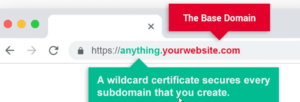When it comes to securing your website and protecting the sensitive information of your visitors, SSL certificates play a crucial role. However, the decision to opt for a free SSL certificate or invest in a paid one can be a daunting task. In this article, we will delve into the differences between free and paid SSL certificates, comparing important factors such as encryption, warranty, validation, and assurance to help you make an informed decision.

What are SSL certificates and their types?
SSL (Secure Sockets Layer) certificates are small data files that digitally bind a cryptographic key to an organization’s details. This enables secure connections from a web server to a browser, ensuring all data passed between the two remains private and integral. There are various types of SSL certificates, each serving different purposes and providing varying levels of validation and assurance.
What is a paid SSL certificate and how does it differ from a free SSL certificate?
![]()
A paid SSL certificate is typically issued by a trusted Certificate Authority (CA) and involves a more rigorous validation process compared to a free SSL certificate. Paid certificates often offer extended validation (EV) or organization validation (OV), providing a higher level of assurance to website visitors.
What are the differences between free SSL and paid SSL certificates in terms of encryption and warranty?
Free SSL certificates and paid SSL certificates employ the same encryption methods to secure data transmission. However, paid SSL certificates often come with a warranty, providing monetary coverage in the event of a security breach or mis-issuance, which is not typically offered with free SSL certificates.
Do free SSL certificates come with a warranty and encryption similar to paid ones?
Free SSL certificates do not typically come with a warranty and may have limitations in terms of encryption strength and assurance compared to paid SSL certificates. Therefore, it’s important to assess the specific security requirements of your website before opting for a free SSL certificate.
Should I pay for an SSL certificate or use a free one?
The decision to pay for an SSL certificate or use a free one depends on the specific needs and risk tolerance of your website. Paid SSL certificates offer several benefits over free ones, including higher assurance, warranty, and level of validation.
What benefits come with paying for an SSL certificate compared to using a free one?
Paying for an SSL certificate ensures a higher level of trust and confidence among website visitors due to the rigorous validation and assurance provided by paid certificates. Additionally, paid certificates offer warranty protection, adding an extra layer of security to your website.
What factors should I consider before deciding to pay for an SSL certificate or use a free one?

Before making a decision, it’s essential to consider the nature of your website, the sensitivity of the data being transmitted, and the level of trust you want to establish with your visitors. High-traffic websites or e-commerce platforms may benefit from investing in a paid SSL certificate for enhanced security and assurance.
Do SSL certificates provide the same level of security whether free or paid?
While both free and paid SSL certificates provide a secure connection between the server and the user’s browser, paid certificates generally offer a higher level of security due to their rigorous validation and warranty coverage.
How do free SSL and paid SSL certificates differ in assurance and validation?
Free SSL certificates often utilize domain validation (DV), which offers a basic level of assurance by verifying ownership of the domain. On the other hand, paid SSL certificates may offer extended validation (EV) or organization validation (OV), providing comprehensive validation of the organization’s identity, and resulting in higher levels of assurance for website visitors.
What are the differences in validation processes between free and paid SSL certificates?
The validation process for paid SSL certificates involves thorough verification of the organization’s details, often including legal documents and business records. Free SSL certificate validation, typically limited to domain validation, offers a more straightforward process focused solely on domain ownership.
How do paid SSL certificates provide assurance and validation compared to free SSL certificates?
Paid SSL certificates offer a higher level of assurance by validating the legal existence and authenticity of the organization, instilling greater trust and confidence among website visitors. This level of validation is not usually achievable with free SSL certificates, making them more suitable for personal websites or small blogs with lower security requirements.
What are the types of SSL certificates available and their respective validation levels?
SSL certificates are available in different types, including DV, OV, and EV, each offering varying levels of validation and assurance. DV certificates provide basic validation, while OV and EV certificates offer higher assurance and validation, making them suitable for business and e-commerce websites.
Are there specific scenarios where it’s better to use a free SSL certificate over a paid one?
There are certain scenarios where using a free SSL certificate may be appropriate, particularly for personal websites or small blogs where the level of assurance required is minimal.
Is it advisable to use a free SSL certificate for personal websites or small blogs?
For non-commercial websites with minimal security needs, free SSL certificates can provide adequate encryption and security, making them a suitable choice for personal blogs or small informational websites.
What are the considerations when deciding to use a free SSL certificate over a paid one for certain projects?
When deciding between a free SSL certificate and a paid one, it’s vital to consider the specific security and validation requirements of the project. Websites with low traffic and minimal customer interactions may find free SSL certificates to be sufficient, while businesses and e-commerce platforms may benefit from investing in a paid SSL certificate for enhanced security.
Can businesses or e-commerce websites use free SSL certificates, or is it recommended to opt for a paid one for better security?
While businesses and e-commerce websites can technically use free SSL certificates, it’s generally recommended to opt for a paid SSL certificate to ensure higher levels of security, validation, and warranty protection. Paid certificates offer a greater sense of trust and assurance for both the website owner and its visitors.
How do certificate authorities play a role in choosing between free SSL and paid SSL certificates?
Certificate authorities (CAs) are instrumental in issuing SSL certificates and play a crucial role in deciding between free and paid SSL certificates.
What factors should I consider when selecting a certificate authority for obtaining free or paid SSL certificates?
When choosing a certificate authority, it’s important to consider factors such as validation processes, warranty coverage, and the level of trustworthiness and reliability offered by the CA. Paid SSL certificates often involve reputable CAs that provide comprehensive validation and assurance.
Do different certificate authorities provide different levels of validity and assurance for free and paid SSL certificates?
Yes, different certificate authorities may offer varying levels of validation and assurance for both free and paid SSL certificates. Reputable CAs such as Vastspace and GoGetSSL provide reliable SSL certificates with different validation levels to cater to various security needs.
How do I evaluate the reliability and trustworthiness of certificate authorities offering free and paid SSL certificates?
When evaluating certificate authorities, it’s essential to review their reputation, customer reviews, warranty coverage, and adherence to industry standards. Reputable CAs with a track record of providing secure and reliable SSL certificates offer peace of mind to website owners and their visitors.




